When you first move into a new home, you might be in love with the place, excited for a new start, and overlooking any potential flaws or shortcomings. But over the years, as the honeymoon period wanes and you experience life changes, you might find that your home is no longer fitting your or your family’s wants and needs.
With numerous popular reality TV shows romanticizing home buying and renovation, it’s not surprising that many homeowners, consider improving their housing situation by updating a current home, or listing it and finding a better fit.
Though there are many factors to take into consideration when you’re deciding whether it’s worth it to renovate your current home or better to find a more suitable match, in this blog post we’ll zero in on the following key items to help you determine what’s best for you:
• Location of Home
• Home’s Potential
• Cost
• Timeframe and Convenience
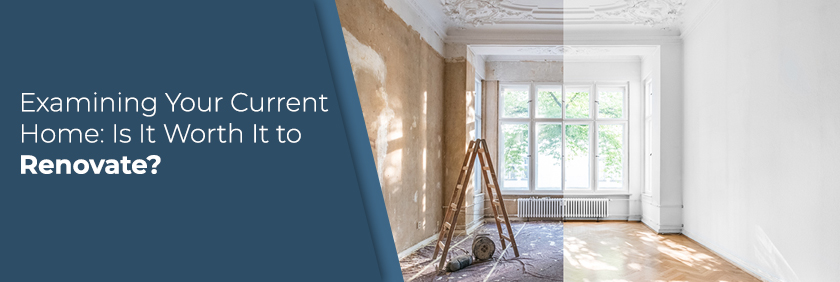
Examining Your Current Home:
Is It Worth It to Renovate?
Many homeowners, enticed by the dazzling home transformations they see on TV, online, and in glossy magazines, dream about how they can upgrade their own houses. HGTV, Pinterest, and other sources can show you how to see the hidden potential in any home, but the reality of renovation is often a stark contrast from the quick turnaround and final, magical metamorphosis packaged for the viewer.
That’s not to say that—with realistic expectations—home renovation isn’t the right answer for you. But before you begin a major remodel, it’s important to consider the limitations of your home, to determine if it is worth the cost and effort. At the top of this list is location.
Location
When real estate agents talk about “location,” they are really referring to many different aspects that have to do with the surrounding environment and physical placement of the home. According to Investopedia, important location considerations include:
- Centrality: Consider how central or close the home is to work, school, family, shopping districts, and recreation.
- Neighborhood: Think about qualities of your neighborhood that you like or dislike, as well as its nearby amenities like restaurants, schools, and shopping.
- Development: Think about ways in which the surrounding area is changing and what these changes will mean for you. Sometimes change can be good. As Investopedia states, “plans for schools, hospitals, public transportation, and other public infrastructure can dramatically improve property values in the area.”
- Lot and Land: This involves both how the lot is situated in terms of its immediate surroundings (i.e. neighbors, the block, nearby intersections) as well as the value and unique characteristics of the land the house sits on.
The details of location are something that cannot be changed no matter what else you do to your home. If after careful examination you’re happy—or at least content—with the location of your home, go ahead and start dreaming about the possibilities of renovation. But if any of these aspects gives you pause, it might be a good idea to explore what other homes have to offer.
Your Home’s Potential (and Limitations)
If you have a limited budget, there’s only so much you can do within the limits of your house’s size and structure. Before you break out the sledgehammer, think about the amount and cost of work that would go into a remodel in order for it to truly work for you.
Size of the House
Consider the square footage of the whole house: if it is manageable, too small, or even too large. If you find yourself limited by space, an addition might be a feasible solution. However, additions, though common, are expensive and take a lot of time to complete. HomeAdvisor estimates that the cost of most home additions range from about $20,000 to $70,000.
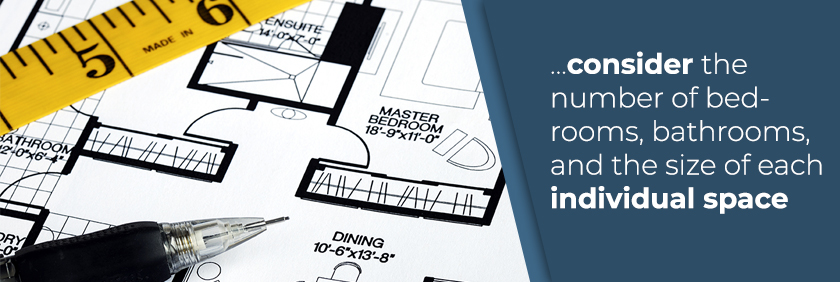
Floorplan
If you are unhappy with the flow of your home, consider what would be necessary to make it better. Knocking down walls could make a huge difference in opening up cramped areas, but if a wall is load-bearing it will likely require permits and help from a professional. Relocating or rearranging the floorplan of a kitchen or bathroom might not be worth the cost if you have to move plumbing, gas lines, or wiring. According to several real estate experts interviewed by Business Insider, “major structural changes, like tearing down walls or shifting the placement of plumbing, are almost never a good investment.” Consulting an architect, contractor, or experienced real estate agent before you solidify plans could save you a lot of trouble in the long run.
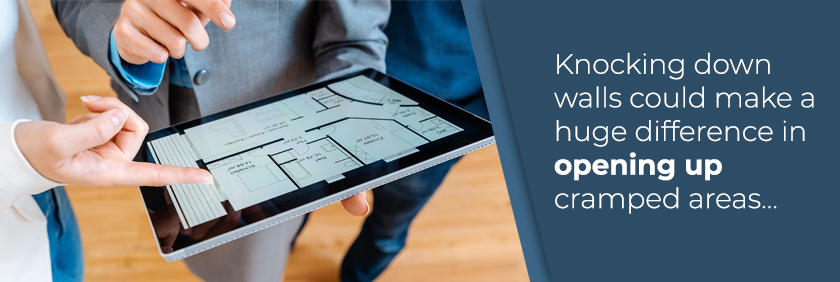
Future Suitability
Lastly, consider if realistic improvements will allow the house to grow with you through projected life changes. Can you plan a renovation that can accommodate your life now, as well as down the road?
Cost to Renovate A Home
For most people, it’s impossible to make any major decisions about housing without first figuring out what you can reasonably afford, as well as what is a good investment. While some home improvements can be paid for out-of-pocket, larger renovations often require a home equity, line of credit, or construction loan. Take a hard look at your finances and current monthly budget to determine what size payment you can afford and speak with a lender or two to discuss qualifications. Doing some research to get a rough idea of how much home renovations generally cost is also a good idea Business Insider offers this useful guide to home renovation costs, but each home will have its own idiosyncratic requirements, and actual costs often go over budget.
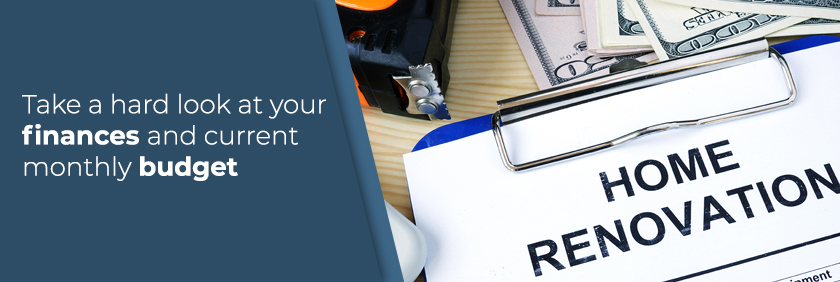
Once you’ve determined your budget for renovations, it’s helpful to make a two-tiered plan: the absolute minimum you need to be happy with your home, and your biggest dreams for the space. Then take these plans to several contractors for estimates. It’s likely that the final renovation will fall somewhere in the middle—but if your plans don’t match the reality of the situation, knowing what you can and can’t do on your budget will be helpful in determining whether to stay in your home or find a new one.
Timeframe and Convenience
As estimates come in, you should have some serious discussions with each contractor about how long it will take to complete the renovation and how it might interfere with your daily life. For example, if a major kitchen remodel takes a few months, will you be able to live without a place to cook meals in the meantime? Also consider environmental hazards, especially if you have small children. Older homes tend to carry more risk, so be sure to test for things like lead and asbestos before starting any major demolition. If your home has these risks, renovation costs will increase, which might also influence your decision to remodel or list.
Making the Call
When you love your house and it fits almost all your needs, renovation might be just the answer for you. But if, after thoroughly exploring your options, it turns out that renovation isn’t the right solution, all your hard work will not be lost. Keep that budget and all those dreams and visions in your mind—they will help you narrow your search as you hunt for your perfect home.
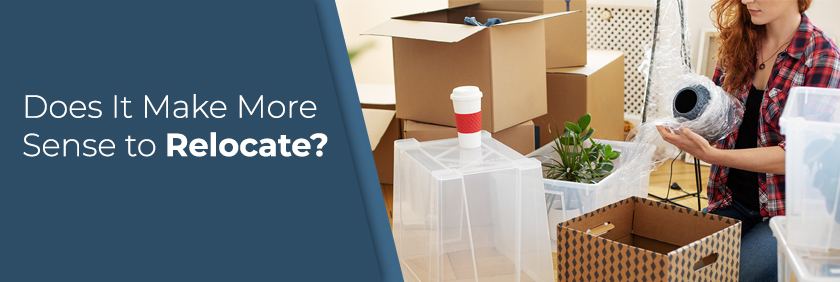
Does It Make More Sense to Relocate?
After consideration, maybe renovation doesn’t seem as appealing as it first did. Or maybe you just want to weigh your options before you make a final decision. Regardless, the first step you should take if you are considering moving is to meet with a trusted real estate agent to help you evaluate the possibilities. When you meet, you’ll likely discuss the main items below, so thinking about them in advance can help your agent quickly zero in on the homes that best fit your needs.
Location
Just as you should think carefully about the location of your current home to help you decide whether to stay or go, when you are looking for an upgrade, location (and all its facets) should also be at the top of your list.
Additionally, note that increased property values in more desirable locations as well as property taxes rates can play a major role in determining what options are financially feasible for you. For instance, as an article in the Washington Post points out, “Instead of buying a $300,000 home in a neighborhood with a 3.5 percent tax rate, you could make the same monthly payment on a $350,000 home in an area with a 2.5 percent tax rate.” With a little research, you might discover that it makes more sense to renovate your current home to stay in a neighborhood you like. Or you might be pleasantly surprised where your budget can take you.
Cost to Relocate
As with renovation, there are two main factors to think about when determining how cost will affect your housing decisions: what you can afford, and what makes smart financial sense. If your renovation plans require extreme changes to your home, it’s probably more cost-effective to simply find a home that’s a better fit, using the equity in your current home to help you get there. On the other hand, well-considered renovations could add more value to your home than they cost you to begin with, while saving you money over the purchase of a move-in ready house.
Conveniences and Inconveniences of Relocating
A major benefit of relocating is that it can allow you to avoid the stress of completing major renovations. However, if you choose to sell your current home, keep in mind that you may still have to complete minor renovations or repairs to get it ready to list. It’s essential to work with an agent here who can help you determine if it’s the right time to sell, what changes are necessary, and what will
Secondly, buying a new home can often get you where you want to go faster than a lengthy renovation process. But it’s still important to have realistic expectations about how relocation can impact your daily life. Preparing a house for sale, listing it, and completing the sale can take months—even in today’s hot market. And packing up your household and starting a life in a new residence is a substantial undertaking. It can be even more complicated if you are buying new construction. A professional real estate agent can not only streamline the process but also help you find a new home that will serve your needs for a long time to come.
Long-term Potential
Ultimately, you want a home that can grow with you, and if you’re considering a major renovation project or a move, chances are that your current home isn’t doing a good job at that. That’s why it’s vital to do some critical thinking first, before you fall in love with another house that may not serve your needs in the long run. But this process isn’t easy, and it’s perfectly okay to not have all the answers on your own.

Get Help Making Your Decision
Your home will likely be your biggest financial investment. But beyond that, it’s your home: the place that you retreat to at the end of a long day, where you raise your family or entertain your friends, and it should reflect what’s most important to you. Because decisions about your home involve both complex practical and personal questions, it’s not surprising that they often feel daunting to navigate alone. Working with trusted professionals will help you through the process, whether it’s home renovation or purchase. At Showcase Properties, we pride ourselves on our knowledge of Central Florida’s housing market. Contact us today to find out how we can help you update your current space—or find something new.